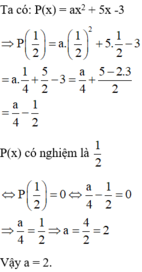
Hãy nhập câu hỏi của bạn vào đây, nếu là tài khoản VIP, bạn sẽ được ưu tiên trả lời.



Ta có : A(x) = \(ax^2+5x-3\)
\(\Rightarrow A\left(\dfrac{1}{2}\right)=a.\left(\dfrac{1}{2}\right)^2+5.\dfrac{1}{2}-3\)
\(=a.\dfrac{1}{2}+\dfrac{5}{2}-3=\dfrac{a}{4}+\dfrac{5-2.3}{2}\)
\(=\dfrac{a}{4}-\dfrac{1}{2}\)
A(x) có nghiệm là \(\dfrac{1}{2}\)
\(\Leftrightarrow A\left(\dfrac{1}{2}\right)=0\Leftrightarrow\dfrac{a}{4}-\dfrac{1}{2}=0\)
\(\Rightarrow\dfrac{a}{4}=\dfrac{1}{2}\Rightarrow a=\dfrac{4}{2}=2\)
Vậy a = 2 .

a.\(\dfrac{1}{2}\)2+2.\(\dfrac{1}{2}\)+1=1
a.\(\dfrac{1}{4}\)+2.\(\dfrac{1}{2}\)+1=1
a.\(\dfrac{1}{4}\)+1+1=1
a.\(\dfrac{1}{4}\)+2=1
a.\(\dfrac{1}{4}\)=1-2
a.\(\dfrac{1}{4}\)=-1
a= -1:\(\dfrac{1}{4}\)
a= -4

Đa thức có nghiệm là `1 =>x=1` thỏa mãn: `a.1^2+5.1-4=0`
`<=>a+1=0`
`<=>a=-1`

a: Bậc là 2
Hệ số cao nhất là 2
Hệ số tự do là -12
b: M+N
=2x^2+5x-12+x^2-8x-1
=3x^2-3x-13

P(x) = ax2 + 2x + 1
P(1/2) = 1 <=> a . (1/2)2 + 2 . 1/2 + 1 = 1
<=> a . 1/4 + 1 + 1 = 1
<=> a . 1/4 = -1
<=> a = -4
Ta có : \(P\left(x\right)=ax+2x+1\)
\(P\left(\frac{1}{2}\right)=a.\left(\frac{1}{2}\right)^2+2\left(\frac{1}{2}\right)+1=1\)
\(\frac{a}{4}+1=0\Leftrightarrow\frac{a}{4}=-1\Leftrightarrow a=-4\)

a) P(x) = ax2 - x + 5
Nghiệm của đa thức = 1
=> P(1) = a . 12 - 1 + 5 = 0
=> a . 1 - 1 + 5 = 0
=> a + 4 = 0
=> a = -4
b) P(x) = 2x2 - ax + 1
Nghiệm của đa thức = -2
=> P(-2) = 2.(-2)2 - a.(-2) + 1 = 0
=> 8 + 2a + 1 = 0
=> 9 + 2a = 0
=> 2a = -9
=> a = -9/2
c) (3x + 2) - 2(x+1) = 4(x+1)
=> 3x + 2 - 2x - 2 = 4x + 4
=> 1x + 0 = 4x + 4
=> 1x = 4x + 4
=> 1x - 4x = 4
=> -3x = 4
=> x = -4/3
a, Ta có :
\(P\left(1\right)=a1^2-1+5=0\Leftrightarrow a+4=0\Leftrightarrow a=-4\)
b, Ta có :
\(P\left(-2\right)=2\left(-2\right)^2-a\left(-2\right)+1=0\Leftrightarrow2.4+2a+1=9+2a=0\)
\(2a=-9\Leftrightarrow a=-\frac{9}{2}\)
c, \(\left(3x+2\right)-2\left(x+1\right)=4\left(x+1\right)\)
\(\Leftrightarrow3x+2-2x-2=4x+4\)
\(\Leftrightarrow x=4x+4\Leftrightarrow x-4x=4\Leftrightarrow-3x=4\Leftrightarrow x=-\frac{4}{3}\)

Ta có : \(P\left(\dfrac{1}{2}\right)=a\left(\dfrac{1}{2}\right)^2+2.\dfrac{1}{2}+1=1\)
=> \(\dfrac{1}{4}a+1+1=1\)
\(\dfrac{1}{4}a=-1\)
\(a=-1:\dfrac{1}{4}\)
a=-4
Ta có: \(P\left(x\right)=ax^2+2x+1\)
⇒ \(P\left(\dfrac{1}{2}\right)=a.\left(\dfrac{1}{2}\right)^2+2.\dfrac{1}{2}+1=1\)
\(=\) \(a.\dfrac{1}{4}+1+1\) \(=\dfrac{a}{4}+1:1\)
\(=\dfrac{a}{4}+1\)
⇒ \(\dfrac{a}{4}+1\)⇔ \(\dfrac{a}{4}-1\) ⇔ \(a=-4\)
Vậy hệ số a là \(-4\)